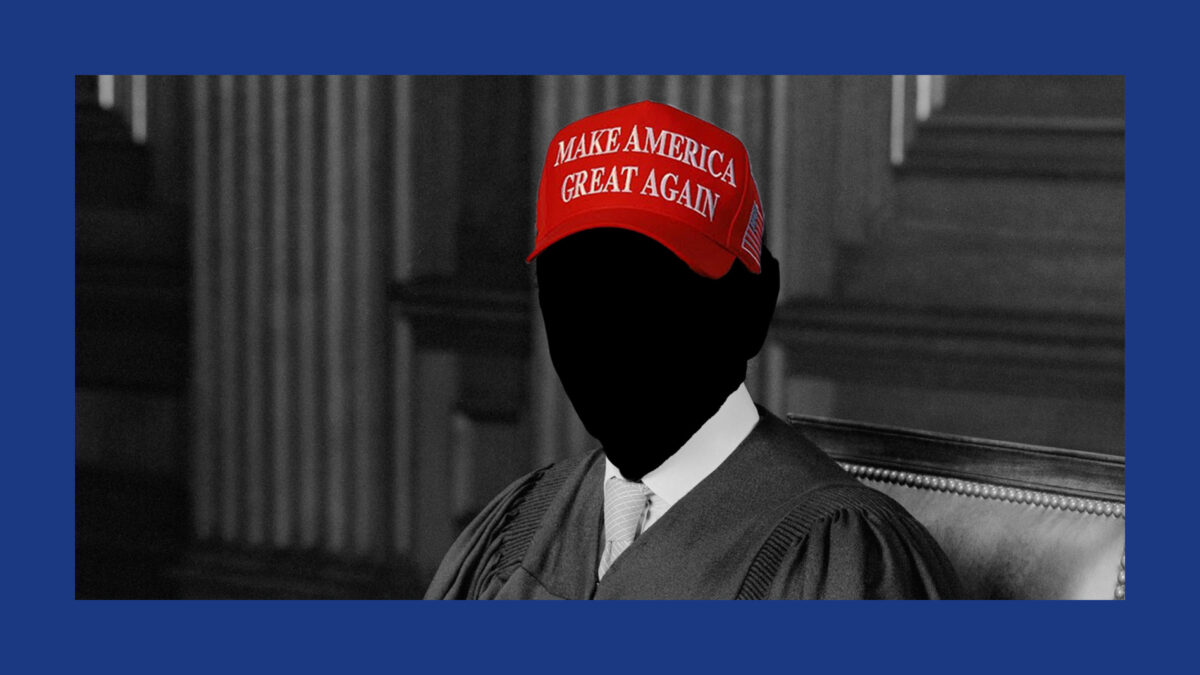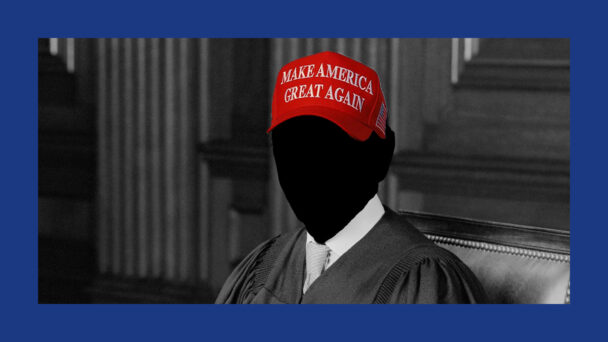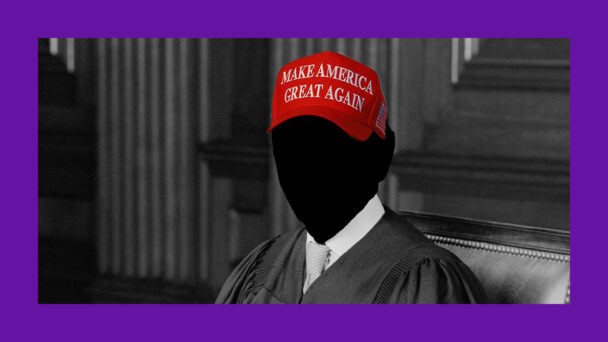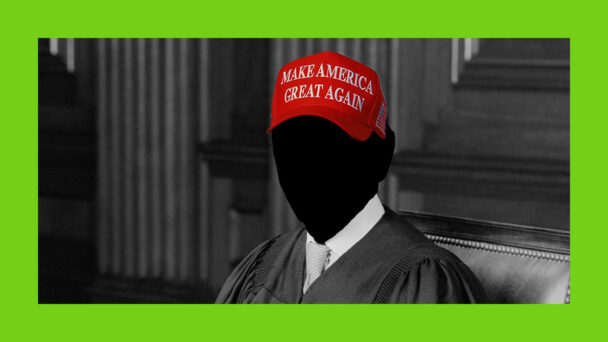Welcome to the FedSoc Twelve, a Balls & Strikes series about some of Donald Trump’s most unhinged judicial appointees. These judges, whether in their legal opinions or their off-the-clock conduct, have continued to push Trump’s agenda from the bench, forming something of a life-tenured Originalism Caucus within the federal judiciary. This summer, we’ll be checking in on these men and women now that they’ve gotten a chance to spread their wings under the Biden administration—and as they fight to be first in line for a Supreme promotion the next time Republicans control the White House.
The Resume:
Lawrence VanDyke graduated from a Denver-based bible college that still teaches that “God’s original plan, from the beginning, was one man and one woman for life,” that remarriage after divorce is a sin, and that women must “assum[e] a submissive position” in the church. Worse, he went to Harvard Law School.
Before joining Harvard Law Review in 2003, VanDyke was an editor for the school’s Journal of Law and Public Policy. This particular Journal has a fancy name, but it is a right-wing rag; it sells itself as “the nation’s leading forum for conservative and libertarian legal scholarship” and is a “sister organization” of Harvard’s Federalist Society. VanDyke is, of course, a member of the Federalist Society.
Safely ensconced in the heights of the conservative legal movement, VanDyke never left. His resume is a who’s-who of right-wing government law offices. After clerking for Judge Janice Rogers Brown, a George W. Bush appointee, he joined the Texas Solicitor General’s office before becoming Solicitor General in both Montana and Nevada.
In Nevada, VanDyke had his dream job, signing on to other states’ high-profile lawsuits against the Obama administration and doing very little day-to-day legal work. Before that, he had hoped to do the same in Montana, but Montana’s Attorney General actually expected him to take depositions, respond to discovery requests, and otherwise do the grunt work of litigating the cases he decided to bring. Faced with the prospect of having to actually practice law, VanDyke quit in a huff, ran for the Montana Supreme Court, lost, then fled to Nevada. In 2019, Trump appointed him to work in the DOJ’s Environment and Natural Resources Division before nominating him to the Ninth Circuit later that year.
VanDyke faced an unusual Senate confirmation battle in part because the American Bar Association rated him not qualified to be a judge. The ABA said former colleagues described him as “arrogant, lazy, an ideologue, and lacking in knowledge of the day-to-day practice.” The ABA went on to say that he “lacks humility … does not have an open mind, and does not always have a commitment to being candid or truthful.” But what the Judiciary Committee found even more troubling were concerns his colleagues raised that he may not “be fair to persons who are … part of the LGBTQ community.” When asked about this last remark during his confirmation hearing, VanDyke broke down in tears, replying while crying that “It is a fundamental belief of mine that all people are created in the image of God, and they should all be treated with dignity and respect.” Stay tuned on that!
The Opinions
Long gone are the days when the Ninth Circuit was one of the country’s most liberal courts of appeals. During his presidency, Trump appointed 10 judges to the court, including VanDyke. Its partisan balance is now a decidedly moderate 16-13. VanDyke has used that new leverage to push two of his favorite hobbyhorses as far as he can: restricting immigration and overturning gun laws.
Immigration law can be complex, but don’t worry: VanDyke makes it easy. Most immigration cases are heard by the Department of Justice’s Board of Immigration Appeals. Congress set the bar high for overturning their decisions. In most cases, a reviewing court must take the Board’s “administrative findings” as “conclusive.” Unlike in other areas of administrative law, where conservative justices routinely seek to undermine agencies’ authority and overturn their regulations using spurious legal theories, right-wing judges like when a federal agency decides to deport someone, deny their asylum claims, or deny a visa. But VanDyke goes further, insisting in every case that the Ninth Circuit must defer to the Board’s decision to deport someone.
When the Ninth Circuit doesn’t defer to the Board, he dissents – loudly. He’s called cases where the Ninth Circuit didn’t order a person to be deported “abysmal and indefensible,” accusing the court of “doing everything in [its] power … to upset” the Board’s decisions. In the only reported case where VanDyke voted to overturn a Board decision, he made sure to write separately that the circuit precedent that compelled his vote was “silly” and “illustrates our … nasty habit of muddying immigration law.” And he’s not above xenophobic fearmongering in these opinions, either. If a person seeking to stay in the United States has any criminal history, he makes sure to include every detail, whether it’s relevant to the case or not.
VanDyke has also made a name for himself as a Second Amendment absolutist. He dissented in a case upholding a federal law that prohibited people who have been involuntarily committed from buying handguns. He also dissented furiously in Duncan v. Bonta, where the Ninth Circuit upheld California’s restrictions on magazines with more than 10 rounds. California passed this law to make mass shootings harder to commit. In Duncan, the majority opinion carefully explained California’s reasoning for the rule, noting that three out of every four mass shooters purchases their guns lawfully and that large magazines strongly correlate with more deaths in shootings.
None of that mattered to VanDyke, who ranted that “the majority of our court distrusts gun owners and thinks the Second Amendment is a vestigial organ of their living constitution” and bizarrely intimated that mass shootings don’t happen enough to justify making rules to prevent them: “You would think that if the government seeks to interfere with a fundamental right, the infrequency of the claimed harm would be a very important consideration.” He ended by calling on the Supreme Court to adopt a rule that would “cabin [his] errant brethren” and keep them from upholding gun regulations. A year later, the Court agreed, holding in Bruen that gun regulations would be overturned if they weren’t consistent with the Second Amendment’s “history and tradition.”
The Weird Shit
The ABA warned that VanDyke was arrogant, lazy, and a homophobe. In the few years he’s been on the bench, he’s proven that, if anything, the ABA was underselling his character flaws.
First: arrogance. VanDyke has made a name for himself as an asshole. Federal judges disagree with each other frequently, but usually with some measure of decorum. After all, these people work together—imagine going to your job after sending an email calling everyone you work with a bunch of idiots. But in his opinions, VanDyke basically does that. It’s gotten so bad that his fellow judges have started to complain. In Bonta, when VanDyke accused his fellow judges of “distrust[ing] gun owners” and thinking that the Second Amendment is “vestigial,” Judge Andrew Hurwitz, an Obama appointee, wrote separately that VanDyke “has no basis for attacking the personal motives” of his fellow judges and that “[r]easonable judges can disagree” whether any law violates the Second Amendment. Judge Hurwitz asked to be treated with “the same level of respect” he shows his conservative colleagues. Good luck with that.
Second: laziness. Judges are supposed to explain why they vote the way they do, grounding their decisions in similar cases and other research. But even with multiple clerks working for him, VanDyke sometimes hasn’t bothered writing real opinions. In 2019, local governments and advocates filed a case challenging the Trump Administration’s “public charge” rule, which allowed immigration agencies to deny entry to immigrants who might use some public benefits programs. The Ninth Circuit stayed the rule in a 30-page opinion after hearing arguments from over a hundred lawyers representing dozens of cities, states, and organizations. VanDyke, however, wrote a one-sentence dissent that essentially said “I disagree for reasons the Fourth Circuit said.” (Once again, the Supreme Court sided with him, allowing the rule to go into effect in January 2020 before the Biden Administration was able to repeal it in 2021.)
Then there’s his queerphobia. VanDyke pledged that he would treat LGBTQ people with “dignity and respect.” But he’s failed that test. In Green v. Miss USA, a trans woman, Anita Green, sued the Miss USA beauty pageant for excluding trans women from participating. Anita argued that this practice violated Oregon state nondiscrimination law, which prohibited “public accommodations” from discriminating against trans people. VanDyke held that the law violated Miss USA’s First Amendment rights. On extremely thin evidence, he was satisfied that the Miss USA pageant believed firmly that only cisgender women had “real” womanhood. In a weird by-your-logic turn, he compared Miss USA’s discriminatory policy to Hamilton’s casting calls. It doesn’t make more sense after reading his explanation. Apparently, because Lin-Manuel Miranda was allowed to ask people of color to audition to play the Founding Fathers, the Miss USA pageant had to be allowed to exclude trans women.
Judge Susan Graber, a Clinton appointee, dissented. She pointed out that the court didn’t even need to reach the question whether Miss USA had First Amendment rights at all, because it wasn’t clear that Oregon’s law applied to beauty pageants instead of businesses that serve everybody like restaurants and hotels. The judges could have sent the case back to the trial court to figure that out. But VanDyke decided the case anyway. And along the way, he was clear that he, too, didn’t believe that Anita was a “real” woman. He pointedly introduced Anita by saying that she “self-identifies as ‘an openly transgender female,’” and refers to her having “male anatomy.” And, like several other Trump judges, he refused to refer to Anita using female pronouns, calling her by her surname “Green” throughout the opinion. VanDyke could have drafted an opinion that recognized Anita’s humanity and gender identity and still held in favor of Miss USA. It would have cost him nothing. Instead, he went out of his way to be snide and cruel to a woman who had sought protection in his court.
But maybe that’s the wrong way to look at it. After all, VanDyke was on Trump’s shortlist of Supreme Court candidates in 2020. Keep in mind, he’s not auditioning for you or me to nominate him for the Supreme Court. He’s auditioning for Donald Trump to do it. And when it comes to getting Trump’s attention, a little arrogance, cruelty, and discrimination can go a long way.




